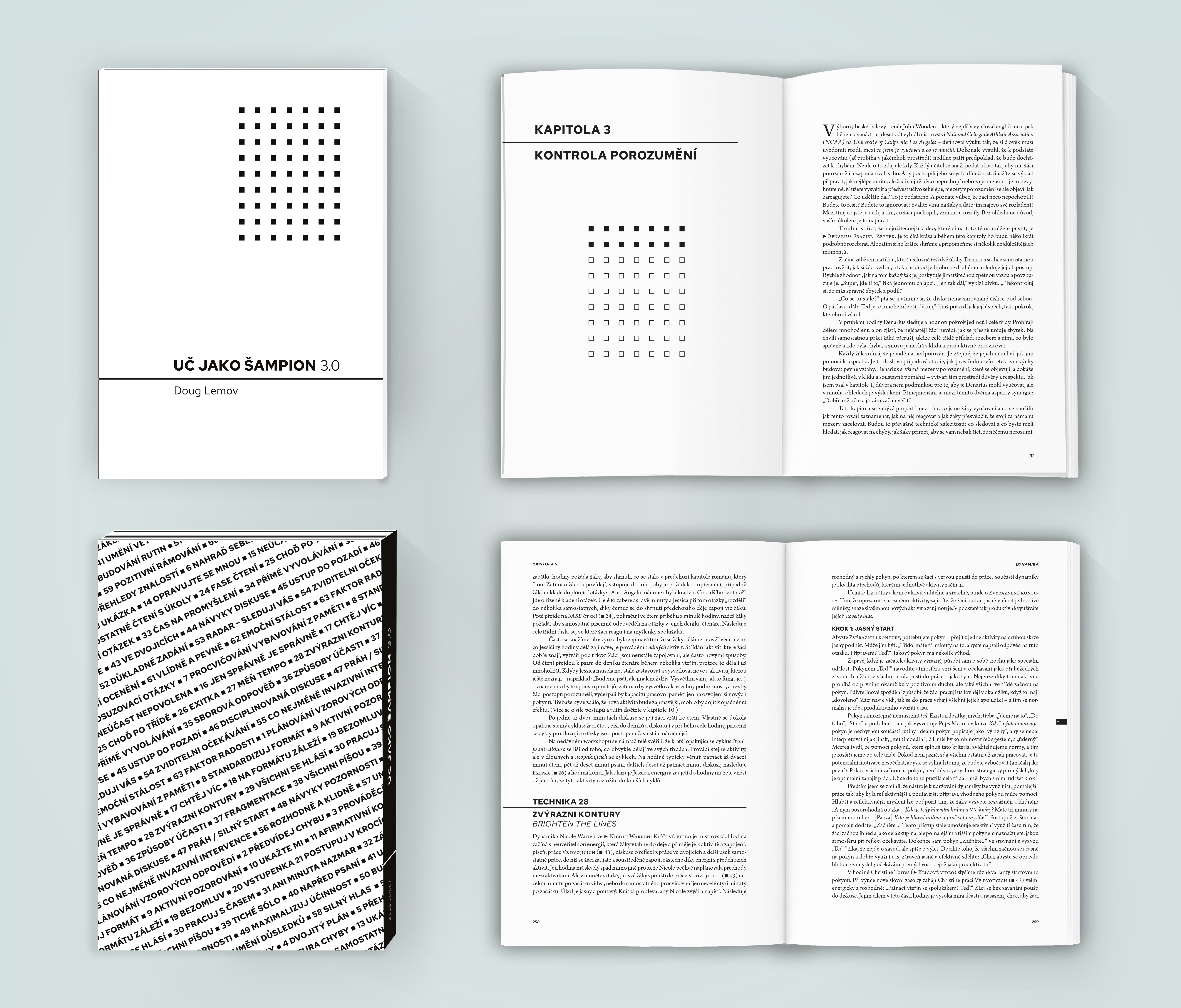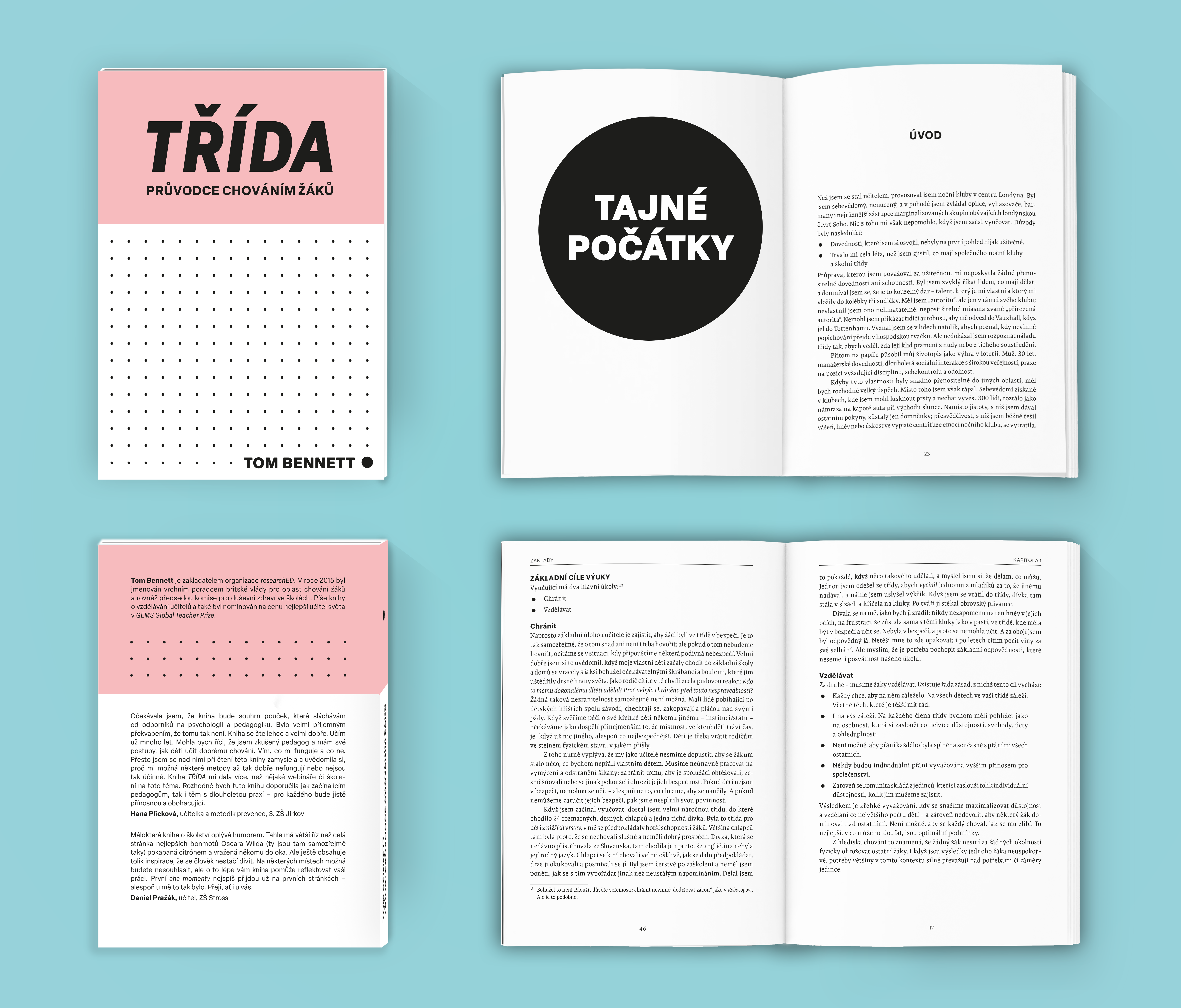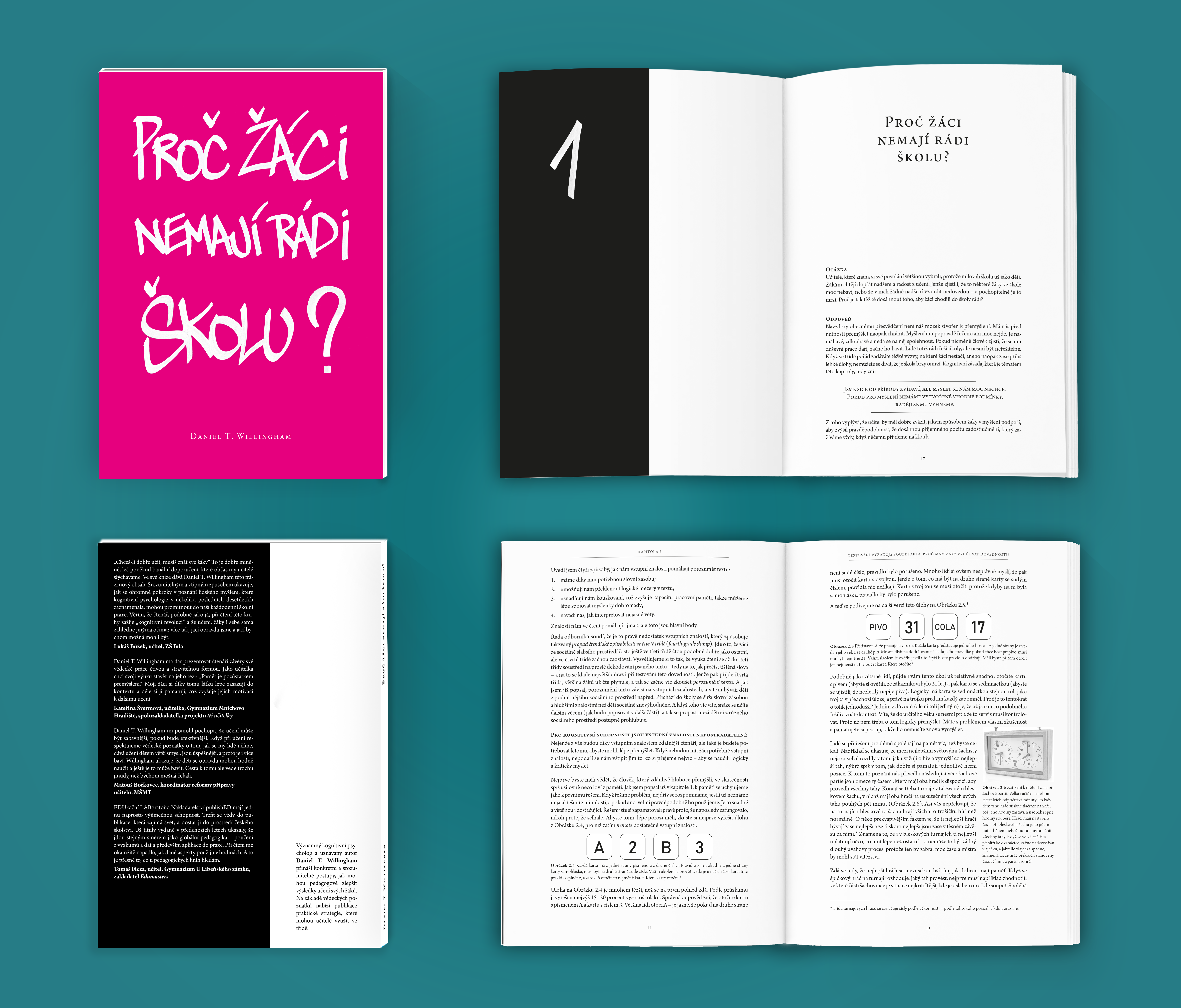#NEWS, Strana 2
EDUkační LABoratoř has published a translation of bestselling book for teachers Teach Like a Champion 3.0. Its author, Doug Lemov, has spent years observing and studying the work of many excellent teachers in schools across the United States and the United Kingdom. One thing they have in common – their students achieve many times better results than students from neighbouring schools.
They work in areas of high deprivation, and yet, their students achieve exceptional outcomes: Such teachers have been your fascination, inspiration and the source of techniques you write about in Teach Like a Champion. Is there anything else all of them have in common?
Part of the answer, interestingly, is no. By which I mean there is no “type”… there’s nothing you have to be like, no style you have to use, to be a great teacher. You can be an introvert or an extrovert. Funny or serious. Great teachers come in all styles and you can be great and still be ‘you’… which is really important. What I’ve sought to describe is not a formula but a set of tools that people can use to be the best version of themselves.
That said the answer “no” above is only part of the truth. Generally speaking I think the best teachers are hungry to learn and improve. They take pleasure in mastering the craft of teaching. And I think it’s really important for there to be ways to keep the job interesting for those people. If we don’t create pathways for people who love to think about the craft of teaching to get constantly better, many of them will seek challenges elsewhere and leave the profession.
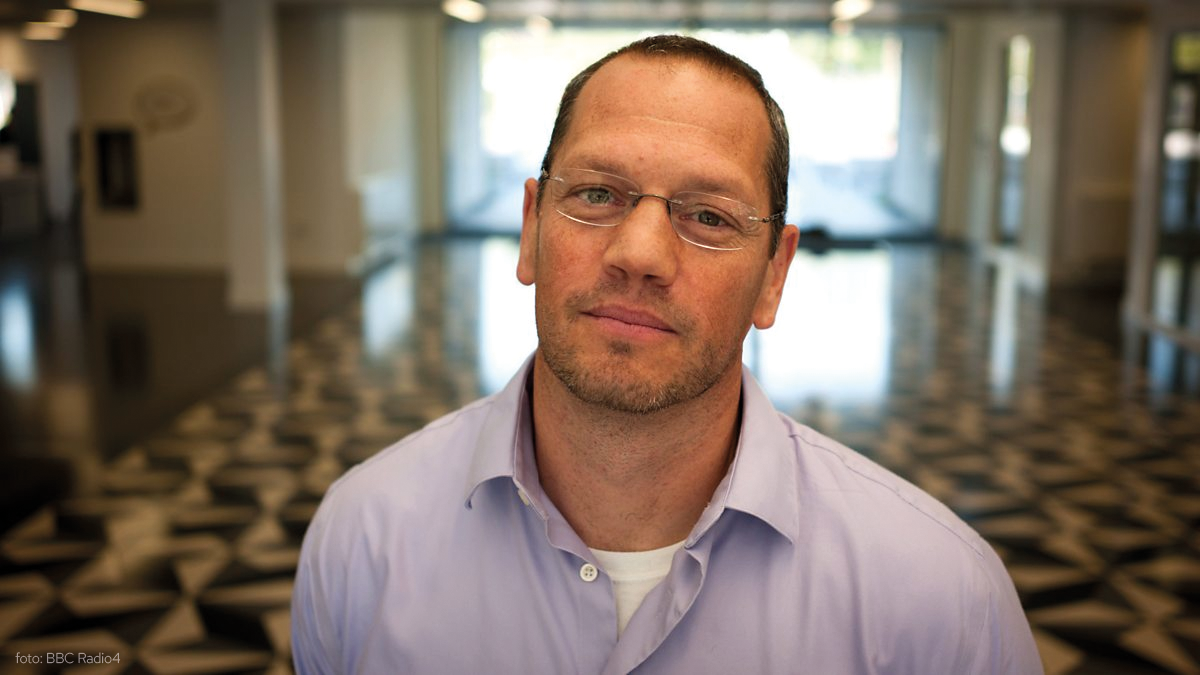
Doug Lemov is the founder and Chief Knowledge Officer at Teach Like a Champion. He was a managing director of Uncommon Schools and he was formerly the managing director for Uncommon’s upstate New York schools. Before that he was Vice President for Accountability at the State University of New York Charter Schools Institute and was a founder, teacher, and principal of the Academy of the Pacific Rim Charter School in Boston. He has taught English and history at the university, high school, and middle school levels. He holds a BA from Hamilton College, an MA from Indiana University, and an MBA from the Harvard Business School. Visit him at teachlikeachampion.com.
Teach Like a Champion has come out in three editions already. What makes the most current one stand out?
In the third edition I’ve tried to be much more explicit about connecting the technique to cognitive science. One thing that cognitive science tells us is that having a mental model—a clear picture in your mind of what the desired outcome looks like—helps to make decisions under complex circumstances. So the first chapter is explicit about defining five key principles that should inform a teacher’s mental model of the classroom: they summarize what we know about learning, memory, habits, relationships. When you can see the goal more clearly you make better decisions about how, when and why to use a given tool along the way.
Another key difference is the emphasis on Lesson Preparation—there’s a whole chapter on it! It’s different from lesson planning. It’s how you get ready to teach so you and your students are successful. Interestingly a lot of what that entails is thinking about limitations on our own working memory as teachers. Basically there are always too many things to observe and think about at any given moment for a teacher.
There are 63 techniques in your book, ranging from a “strong start” of lessons to effective delivery of consequences if students misbehave. How relevant are they across varying school levels?
They’re all tools. And tools are used to solve problems. Some problems are more relevant in some settings. But there are also a lot of consistencies. Take behavior. Is it more important with older students that they understand why you are asking them to do certain things? Absolutely. Will you have to be clearer at the outset about your expectations and why you have them and will you have to frame the reasons in terms of “purpose” rather than “power”? Probably. But all people—adults, young people, small children—are highly influenced by their perception of peer norms. We are a species of group formers and we want to know what is required of us to belong. Peps Mccrea writes that the greatest single influence on behavior and motivation is the individual’s perception of the peer norm. So we always want to magnify the visibility of positive norms to shape culture.
I guess this is a way of saying, every setting is different—every teacher; every subject; every group of students—but all settings have much more in common that people often think and applying similar principles in slightly different ways is often the fastest route to success.
What is your take on teacher positivity and praise? You say they are often misunderstood. Why?
Great question! There’s a lot of well-intentioned misinformation about praise. Its purpose is to build positive classroom environments. That’s a good thing. But the proposed means of getting there are often wrong and sometimes counter-productive. In the US teachers are often told to “praise five times as often as you criticize” or to “use a praise sandwich”—that is, say something nice, give constructive feedback, and then say something else nice.
This is poor advice. To believe that we have to say two nice things to be able to say, “Your writing is unclear because you use passive verbs. Go back and try to re-write it using active verbs,” to a student is to suggest that young people are fragile. And of course when we praise disingenuously over and over to make a bit of criticism go down students learn to disregard our praise. And praise is a powerful tool! It helps people know what to replicate.
I suggest the idea of positive framing instead. This is the idea that we can give direct, clear constructive criticism that still builds a positive culture if we are attentive to our language. If we can challenge students–“See if you can revise that using active verbs,” or talk aspirations—“I think your writing is getting good enough now that you’re ready to focus on using more active verbs”—we can express our belief in students in an honest and genuine way and stop wasting time giving them false praise that they know isn’t sincere.
Teach Like a Champion promotes high academic ethos, aiming at, among other, maximizing students‘ attendance to teachers and peers. Simultaneously, you write that this behavior is not quite natural to humans. Why should then teachers create something artificial, if the world outside of the classroom does not resemble it?
I would argue that there is no “neutral” culture in the classroom. We are always aiding the construction of a culture- the question is whether we will do so intentionally with learning and thriving in mind or whether we will let decisions devolve to the forces that shape it when the person in authority neglects doing so. I know a lot of teachers in the US who think that what emerges when they don’t shape culture intentionally is “theirs” meaning it belongs to the students and expresses their values and desires. I think that’s untrue. What you get is what grows in a vacuum. Many of the students actually don’t like it when culture is set by the loudest among them, for example, and they feel pressure to go along with it.
Our responsibility is to build cultures in the classroom that maximize learning and the psychological well being of our young people. That requires the intentional and benevolent exercise of authority. Some people are uncomfortable with that word: authority. They confuse it with ‘authoritarianism.” But really those words are opposites. You have been entrusted with authority for a reason—families rely on you to help their children thrive. If you do not use the authority you allow others to be the authority in your classroom and their goal is rarely to maximize the well-being and learning of all 30 pupils.
Many teachers see themselves as creative practitioners with a degree of autonomy. However, Teach Like a Champion might come across quite prescriptive. Do you ever encounter criticism saying that teaching the way you suggest is too uniform?
As I mentioned I think this is a misreading. I try to be very clear in the book. I am describing a set of tools teachers can use. This is why I think the first chapter is so important. It’s designed to help teachers make wise decisions about when and how to use the techniques—and when not to use them.
Your book is all about efficiency and raising students‘ attainment. How does student and teacher wellbeing fit into this?
I think people are happy when they are productive. When their time is honored and when the culture in the classroom reminds them constantly that they and their learning are important. Many of the techniques are about maximizing ‘belonging signals.”
Here’s a passage from the preface where I discuss that issue:
Let me explain what I mean by describing a moment in the life of a student. We’ll call her Asha. She is sitting in Biology class and has just had an idea. It’s half developed—a notion still—but she wonders if she has thought of something that others have not. Maybe this is something smart. She’s a bit scared to share what she’s thinking. Her idea could be wrong or, just as bad, obvious already to everyone else. Maybe no one else cares much about DNA recombination and the fire it has suddenly lit in her mind. Maybe saying something earnest about DNA recombination makes you that kid—the one who raises her hand too often, who tries too hard, who breaks the social code. These sorts of thoughts have heretofore led her to adhere to a philosophy that counsels Keep it to yourself; don’t let anyone see your intellect; take no risks; fit in. But somehow in this moment the desire to voice her thought overcomes her anxiety. She raises her hand and her teacher calls on her.
What happens next is critical to Asha’s future: Will her classmates seem like they care about her idea? Will she read interest in their faces? Will they nod and show their appreciation? Ask a follow-up question? Jot down a phrase in their notes? Or will they be slouched in their chairs and turned away, checking their phones literally or metaphorically, their body language expressing their indifference? Oh, did you say something? Smirk. Will the next comment ignore her idea? Will there even be a next comment, or will her words drift away in a silence that tells her that no one cared enough to acknowledge or even look at her after she spoke?
Yes, it matters whether her teacher responds to her comment with encouragement—but perhaps not as much as what the social environment, the rest of Asha’s peers, communicate. If her teacher praises Asha’s comment amidst scorn and resounding silence from her peers, the benefit will be limited. The teacher’s capacity to shape norms in Asha’s classroom matters at least as much as her ability to connect individually with Asha. Relationships matter, but the social norms we create probably matter more.
While feedback is one of the key topics of your book, Teach Like a Champion does not mention grading explicitly. Should teachers grade students‘ work?
I think so. It’s a form of honesty. We have to help students improve and we have to help students know where they stand so they have the best hope to accomplish their dreams.
You’re known for identifying parallels between academic teaching to sports coaching. What is it that both have in common? And how can teachers benefit from this comparison?
One of the things I’ve learned about most working with coaches in developing athletes is how important perception is to decision-making. To a footballer or a hockey player, sometimes the perception is almost the decision. You can’t make a pass to a teammate you don’t perceive. You can’t defend if you aren’t looking for the right cues. I think teaching is very similar. You can’t make decisions about things you don’t perceive in the classroom. And I think we can take steps to make it so teachers can perceive more of what’s important in the classroom. I discuss quite a bit of that in the chapter on lesson preparation and a lot of that comes from my experiences in the world of sport.
AI and language models have been conquering our world. How will they impact teaching and learning?
The short answer is: I don’t know. But to me the soul of teaching is a relationship between students and knowledge that is mediated by a person, a teacher, and I think it’s highly unlikely that teachers and teaching will become irrelevant any time soon. So I choose to spend my time thinking about that.
Operating predominantly in schools serving areas of social disadvantage, you and your books aim at narrowing the education gap both in the US and worldwide. Have you been successful at this? What is your track record?
Well obviously it’s tricky to run, say, a randomized control trial in schools but if you look at the top performing schools in most parts of the US and much of the UK, especially the ones that achieve great things with students of poverty, a large number use or apply the techniques in the classroom. Many times these are schools with results that are four or five times better than the schools around them. We also have data from settings like ‘high-poverty schools.”
After many years spent in schools and looking into effective teacher practice, are there still things about teaching and learning that would catch you by surprise?
Always. I think that’s what I like about teaching so much. It’s so complex and teachers are such excellent problem solvers. Every time I revise the book I think: “That’s it; that’s the last one” because it’s so hard to write a book. But usually about a week later I notice some teacher doing some brilliant thing I’d never thought of. And I get out my notebook and start making notes towards the next edition.
Pavel Bobek & EDU
Jak zajistit, aby třída plná žáků – často ze zcela rozdílného prostředí – fungovala a učitelé i děti se do ní těšili? A jak přistupovat k používání mobilních telefonů ve škole? Při příležitosti prvního českého vydání knihy TŘÍDA: Průvodce chováním žáků jsme se ptali jejího autora Toma Bennetta. „Představa, že se lidé budou chovat dobře jen proto, že sami chtějí, je lichá,“ říká v rozhovoru pro EDUkační LABoratoř.
Jak se z manažera nočních klubů stane učitel?
Vést noční kluby je práce vzrušující, zároveň ale velmi neuspokojivá. Po letech organizování večírků pro všechny kromě sebe mi začínalo být jasné, že chci najít práci, která by měla potenciál měnit svět k lepšímu a byla intelektuálně zajímavá. Když jsem jednoho dne v televizi viděl reklamu lákající k učitelství, v hlavě se mi najednou rozsvítila kontrolka, která říkala: to je ono! Pak už to pro mě byla jasná volba bez vnitřních bojů a dilemat. Jako by najednou celý vesmír chtěl, abych byl ve škole.
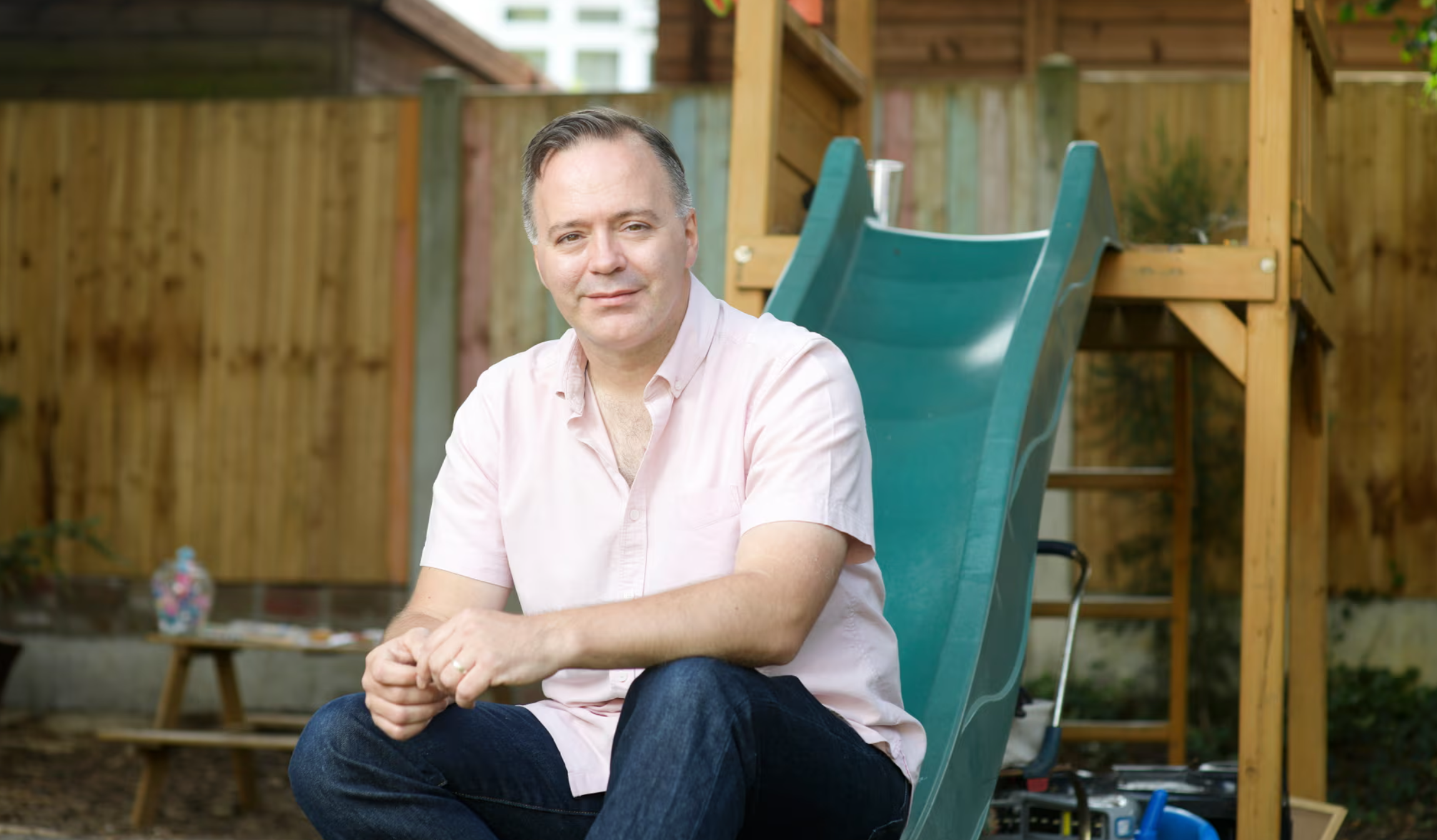
Tom Bennett je zakladatelem organizace researchED, která se zaměřuje na zvyšování výzkumné gramotnosti ve vzdělávání po celém světě. Tom je také redaktorem časopisu researchED. V roce 2015 byl jmenován vrchním poradcem britské vlády pro oblast chování žáků a rovněž předsedou komise pro duševní zdraví ve školách. Napsal čtyři knihy o vzdělávání učitelů a v roce 2015 byl mezi nominovanými na cenu nejlepší učitel světa v GEMS Global Teacher Prize. Je ředitelem společnosti Tom Bennett Training, která podporuje učitele a školy po celém světě. Tom je odborným asistentem Corpus Christi College (University of Cambridge).
tombennetttraining.co.uk
X: @tombennett71
Z pozice učitele jste se postupně dostal k poradenské a autorské roli. Mimo jiné působíte jako poradce konzervativní vlády pro oblast chování na školách. Označil byste svůj přístup k chování na školách také za konzervativní?
Je sice pravda, že politika má vliv na všechno kolem nás a že pokud chceme, můžeme ji vidět za každým naším krokem. Na druhou stranu není vše stranicko-politické nebo ukotvené v jedné ideologii. Šlo by bez problémů tvrdit, že britští konzervativci jsou všechno, jen ne konzervativní – pokud pod tímto slovem rozumíme snahu uchovávat tradice a udržovat tempo změn pomalé. Můj přístup ke vzdělávání je liberální. Klade si za cíl žákovi ve školní komunitě poskytnout maximum svobody, aniž by tato svoboda omezovala bezpečí, úspěch a prosperitu ostatních. Neopomíjí však ani význam potřeb komunity, které by měly být v rovnováze s potřebami jednotlivce. Kromě toho dává důraz na bezpečí a důstojnost každého žáka. Kam mě to politicky řadí, nechávám na každém z vás. Obvykle to bývá tak, že kdo se mnou souhlasí, vnímá mě jako „jednoho z nás“, a kdo ne, označí mě za „jednoho z nich“.
Profesní přípravu anglických učitelů na management chování žáků ve třídě jste v roce 2020 hodnotil negativně: ačkoli jde o zásadní téma, je nepraktická a nevěnuje se jí dostatek pozornosti. Došlo od té doby k posunu?
Ve Spojeném království, respektive Anglii (zatímco školství v Anglii řídí centrální vláda v Londýně, ve Skotsku, Walesu a Severním Irsku je záležitostí regionálních vlád; pozn. red.), došlo k velkému pokroku, a to především díky úsilí učitelů, hlasům, jako je ten můj, a malému počtu sympatizujících politiků a ministrů, kteří si uvědomovali, co všechno je v sázce. Loni jsem přepsal pro školy závazné metodiky ohledně chování a další klíčové dokumenty, jako jsou metodika pro vykázání žáka ze třídy a školy a metodika k tématu duševního zdraví. V souvislosti s tím došlo k reformě požadavků na pregraduální přípravu učitelů a školní inspekce (OFSTED) nyní hodnotí chování žáků na základě zmíněných metodik. A tak přinejmenším v tomto ohledu bych řekl, že ačkoli je ještě dost co zlepšovat, je dnes Anglie v tom, jak připravuje učitele na management chování ve třídách, světovým lídrem.
Anglické školy působí rigidněji a přísněji než ve zbytku Evropy. Uniformy, krátké či téměř žádné přestávky, i menší prohřešky jako vyrušování nebo zapomenutý úkol bývají nezřídka sankcionovány ve formě zmíněného vykázání nebo nechání po škole. Je toto hlavní proud školství v Anglii, nebo jde jen o mediální obraz? Kde se taková kultura v jinak liberální zemi vzala?
Školy se ve svých přístupech liší. O uniformách se vedou debaty po celém světě a je pravda, že jde o něco, co si lidé s Británií spojují. Je to však součástí naší kultury, a pokud máme mít nějaký předepsaný dress code, pak je nejspíš důležité, aby se jím lidé řídili, stejně jako v každém jiném profesionálním prostředí. Co se přestávek týče, britské školy jich podle mě poskytují dostatek! Je pravda, že trestů je tu pravděpodobně více, ale každá komunita je má jako jednu z možných reakcí na přetrvávající nevhodné chování. Pokud je nevyužije, bude tu malá skupina žáků, řekněme přibližně pět procent, kteří si řeknou, že tohle prostě dělat nemusí. A to jsou obvykle ti, kdo školu a vzdělávání potřebují nejvíc. Takže pokud nechcete prohlubovat sociální znevýhodnění a udržet školy zdravé, musíte do celoškolních strategií managementu chování zařadit sankce – mírné, ale důsledné. Bez takové struktury nebudete mít svobodu, ale otroctví dané momentálními preferencemi jedince. Pro zanedbané žáky pocházející z nestabilního a nepodnětného prostředí by taková situace znamenala katastrofu.
Vaše kniha TŘÍDA: Průvodce chováním žáků se věnuje tématům jako zavádění třídních norem a budování kultury. Jedno z hlavních poselství textu říká, že žáky je potřeba naučit, jak se ve škole mají chovat. Na zdech vaší třídy by spíše než plakáty s nápisy typu „Jsi jedinečný!” visely souhrny pravidel chování. Neberou takové postupy žákům svobodu a individualitu?
Na stěnách vyvěšené seznamy pravidel jsou k ničemu, dokud ta pravidla nebudeme žáky učit. Učit žáky chování je způsob, jak jim pomoct k úspěchu v komplikovaném světě institucí, jako je škola. Pokud to neuděláme, necháváme žáky pocházející z nejhorších socioekonomických poměrů napospas osudu. Když někoho naučíte řídit auto, osvobodí ho to od nutnosti chodit všude pěšky. Ten, koho naučíte mluvit cizími jazyky, získá svobodu cestovat a lépe rozumět světu mimo svou vlast. Pokud dospělý dětem upře možnost naučit se správně chovat, je to jeho zásadní selhání v této roli a povinnosti. Děti potřebují, abychom je vedli na cestě k nezávislosti.
Koncept, který doporučujete, klade důraz i na vnější motivaci ve formě rutin, rituálů, odměn a sankcí ve třídách. V Česku existuje názorový proud učitelů, který se vnější motivaci vyhýbá a tvrdí, že základem školního úspěchu je motivace vnitřní. Jak byste se s touto námitkou vypořádal?
Představa, že se lidé budou chovat dobře jen proto, že sami chtějí, je lichá. Protože co když se prostě někomu chtít nebude? Co pak? Můj přístup kombinuje jak vnitřní, tak vnější motivaci. Učím děti, jak se chovat a proč na tom záleží. Pak je zvykám na toto chování v tom smyslu, že se pro ně stává automatismem, že se v něm cítí pohodlně. Když si však rozhodnou, že se nebudou chovat zdvořile a laskavě, vědí, že za to mohou očekávat formální důsledek. Přesně tak to funguje ve společnosti: učíme lidi, jak se chovat na veřejnosti, snažíme se je vést k tomu, aby se k ostatním chovali slušně, a pokud tak nečiní, následuje postih. Ukažte mi společnost, která se bez takového systému obejde! Stejně tak se bez těchto instrumentů neobejdeme ve školách. Musíme užívat obojí: vnitřní i vnější motivaci.
„Každé chování je komunikace” – tvrzení, které je široce rozšířené, nejen mezi učiteli. Vy jej však rozporujete. Proč?
Z triviálního hlediska pravdivé je. Každé chování je komunikace v tom smyslu, že si z něj něco můžeme vzít, něco se dozvědět. Ale co když to chování vyjadřuje přesně to, čím je? Co když dítě mluví sprostě k učiteli nebo sexuálně zneužívá spolužáka? Co tím vyjadřuje? Snaha vidět za vším chováním komunikaci vede učitele k víře, že může pokaždé objevit nějaké tajemné nenaplněné potřeby, postarat se o jejich naplnění a chování zas bude v pořádku. To ale zkrátka není pravda. Většina nevhodného chování není výsledkem záhadných potřeb, ale je dána zcela běžnými lidskými emocemi a přáními jako je touha po uznání nebo zábavě. Učitelé nemají čas na to být ve třídě psychiatry. Bylo by to nesprávné a neefektivní. Trpí-li žák zásadním a hluboko zasazeným traumatem, pak je na místě, aby se tomu věnoval specialista, ne učitel.
Jak mají učitelé z hlediska chování přistupovat k žákům, kteří pochází z náročných poměrů? Měli by k sociálnímu znevýhodnění přihlížet a být k žákům shovívavější?
V žádném případě! Představa, že žáci ze znevýhodněného prostředí nemohou dosahovat úspěchů, je pro tyto děti prokletím. Spíše než shovívavost potřebují školní prostředí naplněné jasnými očekáváními a výukou chování, s hranicemi a důsledností, prostředí, které je bezpečné a předvídatelné. Potřebují kurikulum chování víc než kdo jiný. A v takové škole se mohou naučit, že mají své pevné místo, že na nich záleží, že věříme, že mohou něčeho dosáhnout a že jsou lidské bytosti, které se mohou stát pány svého osudu. K tomu samozřejmě může být zapotřebí trocha podpory navíc, větší vytrvalost, více setkávání. Ale v jádru platí, že kurikulum chování je to, co jim prospěje nejvíc.
Existují pravidla dobrého managementu chování, která by měla platit v každé škole bez výjimky? Pokud ano, jaké by toto nepodkročitelné minimum bylo?
Shrnul jsem je ve své knize; říkám jim principy třídy. Jsou to:
1. Chování je součástí kurikula
2. Děti je potřeba naučit, jak se mají chovat
3. O chování nemluvte. Učte ho
4. Vytvořte prostředí, kde bude snadné chovat se dobře a obtížné chovat se nevhodně
5. Žádná jedna strategie nebude fungovat u všech žáků
6. Základem dobrých vztahů jsou vysoká očekávání
7. Žáci jsou sociální bytosti
8. Důslednost je základem všech dobrých návyků
9. Každý chce, aby na něm záleželo
10. Moje třída, moje pravidla
Váš přístup je v anglických školách často doprovázen explicitní a responzivní výukou s důrazem na ovládnutí učiva všemi žáky. Naši čtenáři už možná budou vědět, že důkazy pro tyto přístupy k výuce pochází z oblasti kognitivních věd a výzkumu efektivity učitelů. Čím jsou podpořeny vaše poznatky z oblasti managementu chování?
Vše, co píšu a co učitelům radím, vychází ze dvou zdrojů: praktická zkušenost s dobře fungujícími třídami a psychologie lidských interakcí. Celá behaviorální psychologie podporuje to, co podle všeho nejlépe funguje ve třídách: studie o konformitě, teorii společenského důkazu, behaviorismu, statusu a identitě jsou východiskem základních myšlenek mého přístupu. Jeho půvab spočívá v tom, že si vzhledem ke svému didaktickému charakteru může půjčovat důkazy z psychologie učení, jako jsou Rosenshinovy principy výuky, teorie kognitivní zátěže, procvičování vybavování z paměti a podobně.
Jak nahlížíte na používání mobilních telefonů ve školách? Anglie jej nedávno zakázala, další země se přidávají. I v Česku sílí hlasy volající po regulaci, ale zatím je to na jednotlivých školách.
Školy by měly mobilní telefony zakázat, a to bez výjimek. Nemám o tom nejmenší pochybnosti. Mají obří vliv na tyto tři oblasti:
1. Učení. Chytré telefony jsou jako černé díry, které doslova nasávají vaši pozornost. Přitom pozornost a soustředění jsou právě tím, o co ve školách jde. A co hůř, mají největší vliv na žáky, kteří jsou nejvíce pozadu.
2. Bezpečí. Děti jsou – bez dohledu – vystaveny libovolnému nevhodnému obsahu, ať jde o horory nebo porno. Napadlo by snad jakéhokoli rozumného dospělého toto dopustit? I když vlastnímu dítěti důvěřujete, vždycky se mohou vedle něj najít ti, kdo mobil zneužijí ke hrůzným účelům. Sexting nebo kyberšikana se staly děsivou součástí života pro příliš mnoho dětí.
3. Socializace. Kdo je na mobilu, nachází se mimo prostředí okolo něj. V tomto stavu se děti jakožto sociální bytosti nenaučí komunikovat s druhými. Stahují se do virtuálních světů, které jim mohou připadat bezpečné, ve skutečnosti jsou však vězením.
Školy, které mobily jednou zakázaly, toho nikdy nelitovaly. Pracoval jsem se stovkami z těch, které to udělaly, a ačkoli to zpočátku může být náročné, žáci, zaměstnanci škol i rodiče tento krok v drtivé většině podporují.
Co si mohou z vaší knihy vzít alternativní školy, které mnohdy kladou menší důraz na řád a pravidla?
Není svobody bez hranic. Poskytneme-li každému dítěti absolutní svobodu, najdou se takové, které budou ostatní trápit, obtěžovat, šikanovat, nebo se přinejmenším nebudou účastnit učení. To není svoboda – to je tyranie silných a nelítostných. Všechny společnosti potřebují hranice, a eventualita sankcí musí být strážcem těchto hranic. Ale to ještě není vše: musíme přijmout za své, že chování je potřeba žáky učit. Musíme žákům ukazovat, že nám na nich záleží, že jsou důležití. A právě proto, že nám na nich záleží, je budeme ochraňovat před sebou navzájem tak dlouho, dokud jednoho dne nebudou schopni chovat se jeden k druhému slušně a s respektem. Když to neuděláme, zradíme je. Potřebují nás. Vždy nás potřebovali. Je to naše zodpovědnost – povinnost, které my dospělí musíme dostát.
Rozhovor vznikl ve spolupráci s Pavlem Bobkem
How to make a classroom full of children – often from completely different backgrounds – effective for students and teachers? And what is the approach to mobile phone use at school? For the first Czech edition of Running the Room: The Teacher’s Guide to Behaviour, we interviewed its author Tom Bennett. „I think it’s an odd way to try to get people to behave – hoping that they will do so because they want to,“ he says for EDUkační LABoratoř.
Why would a nightclub manager change their career to become a teacher?
Running clubs was exhilarating but very unsatisfying. Eventually it wasn’t enough to feel like you were running a party for everyone else; I wanted to do something that made a difference, that gave something back to the world, and that used my mind. When I saw the advert on TV to become a teacher, it felt like a light switch had gone on in my head. It seemed the obvious choice. There was no dilemma or struggle for me. It felt like it was where the universe needed me to be.

Tom Bennett is the founder of researchED, a grass-roots organisation that raises research literacy in education and campaigns for better evidence awareness worldwide. It now holds events in six continents and 13 countries, attracting thousands of followers and generating discussion and change in schools throughout the world. He is also the editor of researchED magazine, with over 15,000 global subscribers. In 2015 he became the UK government’s school ‘Behaviour Czar’, advising on behaviour policy, as well as chairing the Mental Health in Schools panel. He has written four books about teacher training, and in 2015 he was longlisted as one of the world’s top teachers in the GEMS Global Teacher Prize. In the same year he made The Huffington Post’s ‘Top Ten Global Bloggers’ list. He is also the Director of Tom Bennett Training, which supports teachers and schools around the world in creating healthy behaviour cultures. Tom is a Teacher-Fellow of Corpus Christi College, University of Cambridge.
tombennetttraining.co.uk
X: @tombennett71
After spending some years in the classroom, you moved into writing and consultancy. The latter role has also included working as an advisor for school behaviour to the UK’s conservative government. Would you consider your approach to behaviour conservative?
Although politics affects everything, and it is possible to see everything as a political act, I am clear that doesn’t mean that everything is party-political, or affiliated to any one party of ideology. You could easily argue that the current UK conservatives are anything but conservative, if that means to conserve, to preserve traditions and to change slowly. My behavioural approach is liberal, because it seeks to maximise the freedom available to students in a school community as long as it doesn’t restrict the safety, success and flourishing of others. But it also recognises the importance of the needs of the community in balance with the needs of the individual. It also emphasises the need to centre the safety and dignity of the individual student. Where that locates me politically is anyone’s guess. Usually when someone agrees with me, they identify me as one of them, and when they do not, they identify me as one of ‘those over there’!
In 2020, your view on initial teacher training in England with regard to behaviour management was rather negative. Despite the significance of this topic, it did not get the amount of attention and practice it would deserve, you wrote. Has there been any progress since?
In the UK, and by that I mean England, there has been considerable progress made, largely because of the campaigning efforts of teachers, voices like mine, and a small set of sympathetic ministers and politicians who recognised what was at stake. Last year I rewrote the behaviour guidance for schools to follow, as well as other key documents like the exclusions guidance and mental health guidance. There has been some reform of teacher training requirements, and OFSTED (our school inspectorate) now assesses school behaviour based on this guidance. So in this regard, at least, I think England now leads the world in how it trains teachers to manage behaviour, And we still have a long way to go.
Seen from mainland Europe, English schools often appear more rigid and strict than in the rest of the continent. Compulsory uniforms, short or nearly no breaks, detentions and exclusions for minor misbehaviour such as low level disruption or forgotten homework. A school culture that one may not expect in a liberal country. Is this the reality of mainstream schools in England, or rather a media image?
Schools vary in their approaches. Uniform is a debate that rages around the world, and it must be said that uniform is something that does seem very British. But it is part of our culture, and if we are to have any kind of dress code, then it is probably important to make sure the dress code is followed, as it would be in any other place of work. UK schools provide lots of breaks, I think! There are probably more penalties, but any community has them as one possible response to persistent misbehaviour. If you don’t then some children, maybe 5%, think, ‘Well I just don’t have to do this.’ Which are usually the ones who need the education the most. So, unless you want to entrench social disadvantage, you need to have mild but consistent sanctions as part of a healthy whole-school strategy to manage behaviour. When you don’t provide this kind of structure, you don’t have liberty; you have slavery to one’s momentary preferences. That is disastrous to children who come from chaotic or neglectful environments.
In Running the Room, you write about establishing norms and building a school culture. One of your central messages says that school behaviour must be taught explicitly. Your classroom’s walls would most likely show lists of rules rather than motivational phrases such as “You are unique!”. Don’t you think your approach may not be granting enough freedom and individuality to your pupils?
Lists of rules on the wall are useless unless they are taught. And being taught something is a way to help students to be successful in the complicated world of institutions like schools. When we don’t teach these behaviours, we abandon children from the worst socio-economic circumstances to their fates. Teaching someone how to drive, for example, liberates them from having to walk everywhere. Teaching someone how to speak another language frees them to travel more broadly. Not teaching children how to behave is a dereliction of our duty as adults. Children need us to guide them into independence.
Your suggestions to teachers include numerous measures based on extrinsic motivation such as routines, rituals, rewards and sanctions. In Czechia, some teachers try to avoid extrinsic motivation and rely on intrinsic motivation only as a means to secure pupils’ success. How would you respond to this objection?
I think it’s an odd way to try to get people to behave – hoping that they will do so because they want to. Because what if they don’t want to? What then? My approach uses both intrinsic AND extrinsic motivation. I teach children how to behave and I teach them why the behaviour matters. Then I habituate them into the behaviours so that they feel comfortable and automatic in their actions. But if they do not choose to behave civilly and kindly, then they can expect a formal consequence for their action. And this is exactly what we do in society. We teach people how to behave in public, and we attempt to steer them into behaving well with others, but if they do not, then there are penalties. Show me a society that does not have this! That is why it is strange to think we can do this in schools. We have to use both.
“Every behaviour is communication” – a popular assertion, widespread not only among teachers. However, you disagree. Why?
Because it is trivially true. Everything can be communication in the sense that we can learn something from it. But what if the behaviour is communicating exactly what appears to? What if a child swears at their teacher, or sexually abuses a peer? What are they communicating? The desire to see everything as a communication leads teachers to believe that they can somehow unearth some mysterious unmet need that we then have to meet, and the behaviour will be remedied. But this is simply untrue. Most misbehaviour is not the result of something mysterious, but a result of a perfectly normal human emotion and desire, like status, entertainment etc. Teachers simply don’t have time to be psychiatrists in the classroom. It’s incorrect and inefficient. If a child has some deep-seated psychological trauma, then that can only be resolved with specialist help outside the classroom, not by the teacher.
How should teachers approach socially disadvantaged pupils when it comes to behaviour? Knowing a pupil comes from an unstable family environment, should teachers lower their expectations for them?
Absolutely not! The belief that children form poor backgrounds can’t achieve damns them. What they often need more than most are classroom environments with clear expectations, taught behaviours, boundaries, consistency, safety and predictability. They need the behaviour curriculum even more than everyone else. And they can learn that they are valued, that they matter, that we believe they can achieve, and that they are human beings who can become the captains of their destiny. And of course, that might mean extra help learning these protocols than some others, more persistence, more meetings. But at the heart of it, the behaviour curriculum is what they need more than everyone else.
Is there a golden set of rules concerning behaviour management that should be applied in every school? And if so, what would these be?
I summarise these in my book. I call them the Principles of the classroom. They are:
1. Behaviour is a curriculum
2. Children must be taught how to behave
3. Teach, don’t tell, behaviour
4. Make it easy to behave and hard not to
5. No one behaviour strategy will work with all students
6. Relationships are built on trust, which is built on structure
7. Students are social beings
8. Consistency is the foundation of all good habits
9. Everyone wants to matter
10. My room, my rules
In English schools, your approach to behaviour is often paired with explicit teaching and teaching for mastery. Our readers may already know that these are informed by cognitive science and teacher effectiveness research. What evidence do you use to support your suggestions?
Everything I write about and advise is rooted in two things: practical experience of successful classrooms, and the psychology of human interactions. The entire field of behavioural psychology supports what seems to work best in classrooms: writings on conformity, social proof theory, behaviourism, status, identity etc. underpins these basic ideas. The beauty of this approach is that, because it is also pedagogical in nature, it can borrow evidence bases from the psychology of learning, i.e. Rosenshine’s principles, Cognitive Load Theory, what we know about retrieval practice and so on.
Earlier this year, use of mobile phones in schools was banned in England, with further countries joining this policy. In Czechia, voices calling for more rigorous regulation have become stronger recently. So far, schools are responsible for introducing their own rules. What is your take on this?
Schools should ban mobile phones, from gate to gate. There is no question in my mind about this. They have an enormous impact on three areas:
1. Learning. Smartphones are designed to be black holes, sucking in your attention. But attention and focus are very much what we are in the business of in schools. Even worse, they have a greater impact on children who are the furthest behind.
2. Safeguarding. Children are exposed, unsupervised, to every horror, pornographic image, and inappropriate content we can imagine. Why on earth would a sane adult expose children to that? Even if you trust your child, there will always be children who use it for horrible purposes next to them. Sexting, cyber bullying etc. are all a normal and horrible part of too many children’s lives.
3. Socialisation. When children are on their phones, they are not present in the social environment. They do not learn to interact with one another as social beings. They retreat into virtual worlds that feel safe and secure but are actually a prison.
Schools that ban mobile phones never regret it. I have worked with hundreds that have done this, and while it can be hard at first, students, staff and parents overwhelmingly support it.
What should alternative schools, or simply schools which value freedom over rules and order, learn from your book?
You cannot have freedom without boundaries of behaviour; if every child is free to do as they please, some will choose to terrorise others, to victimise, or harass, or simply opt out of learning. That’s not freedom, that’s the tyranny of the strong and merciless. Every society needs to have boundaries, and every boundary must be patrolled with possible sanctions, But these are not the only things we need; we also need behaviour to be taught; we need children to know that they are valued, that they matter to us, and that because we care about them, we will protect them from one another until they are capable of making caring and sociable decisions with one another. When we don’t do that, we abandon them. They need us. They have always needed us. So we need to be adults, and face up to our responsibilities.
The Washington Post označil knihu Proč žáci nemají rádi školu? od profesora kognitivní psychologie Daniela T. Willinghama za „triumf kritického myšlení“. Odborníci ji doporučují nejen všem učitelům, ale také například rodičům, kteří se rozhodli vzdělávat své děti doma. Kognitivní vědy totiž nabízí prokazatelně užitečné způsoby, jak přemýšlet o učení, motivaci a emocích dětí. A Willingham má ještě jednu vlastnost: umí skvěle vysvětlovat. Knihu aktuálně v českém jazyce vydává EDUkační LABoratoř ve spolupráci s Nakladatelstvím publishED. Jejímu autorovi jsme při té příležitosti položili několik otázek.
Originální znění rozhovoru v anglickém jazyce najdete na Cognitive scientist Daniel Willingham: Teachers tell me my book has changed their practice for better
Jaká byla vaše školní léta?
To hodně záleželo na mých učitelích a kamarádech v jednotlivých ročnících. Obecně se ale dá říct, že jsem si školu skutečně oblíbil až na vysoké.
Je vůbec možné, aby školu měli rádi všichni žáci?
Jak se říká: „Očekávej nejhorší, doufej v nejlepší!“ Určitě bychom se měli snažit o to, aby každý žák školu vnímal jako něco, co se mu ve výsledku vyplatí. A to je něco jiného než zábava. Věcmi, které jsou náročné a občas frustrující, se zabýváme všichni. Jakmile ale dosáhneme našeho cíle, dostaví se radost a potěšení.

Daniel T. Willingham vystudoval psychologii na Duke University (1983) a v roce 1990 získal titul Ph.D. v oboru kognitivní psychologie na Harvard University. Je profesorem psychologie na University of Virginia, kde vyučuje od roku 1992. Napsal několik knih a jeho pojednání byla přeložena do sedmnácti jazyků. V roce 2017 ho prezident Barack Obama jmenoval členem National Board for Education Sciences. // Foto: archiv DTW
Jste kognitivní vědec. Co si pod tímto termínem má představit učitel, jenž se s ním setkává poprvé?
Kognitivní vědy zkoumají lidskou mysl. Spojují výzkumné metody a poznatky z vícero oborů, mimo jiné z psychologie, neurovědy, filosofie, antropologie a informatiky.
Je podle vás znalost principů myšlení, jak je odhalují kognitivní vědy, nezbytnou výbavou každého učitele, nebo je možné žáky skvěle vyučovat i bez toho?
Mám za to, že mu může zásadně pomoci. Každý učitel má v hlavě nějaký model toho, jak se děti učí, co je motivuje a jaké emoce prožívají. Na jeho základě pak rozhoduje, jak jednat a reagovat v každodenních situacích ve třídě. Výzkum na poli kognitivních věd učitelům může nabídnout nové a prokazatelně užitečné způsoby, jak o učení, motivaci a emocích dětí přemýšlet.
Co byste vyzdvihl jako příklad vynikající praxe, kterou byste rád viděl v každé škole? Například Michaela Community School v Londýně vyučuje v souladu s poznatky kognitivních věd a její kritici ji označují jako továrnu na učení.
Konkrétně o Michaela Community School mi chybí dostatek informací k tomu, abych to mohl blíže posoudit. S jistotou ale mohu říct, že existuje pluralita cest, jak uzpůsobovat školy a třídy v souladu s principy kognitivních věd. Je to podobné jako s architekturou: Pokud při navrhování budovy nerespektujete principy fyziky a vlastnosti materiálů, vaše budova nebude stát. Samotná fyzika ani vlastnosti materiálů vám ovšem neřeknou, jak má vaše budova vypadat — to závisí na její velikosti či užitých materiálech. Stejně tak kognitivní vědy ukazují obecné principy toho, jak docílit ve výuce úspěchu – nepředepisují však konkrétní metody výuky.
V Česku se aktuálně hodně mluví o badatelské výuce. Mnozí učitelé do ní investují spoustu času a sil. Vy namítáte, že chtít, aby žáci přemýšleli jako vědci, není realistický cíl. Říkáte, že žáci nejsou experty, ale začátečníky, a proto i jejich způsob přemýšlení je zcela jiný. Lze podle vás postavit badatelsky orientovanou výuku tak, aby se opírala o poznatky kognitivních věd?
Nemyslím si, že by děti neměly nikdy zkoumat nebo objevovat. Jednoznačně se jedná o důležité návyky mysli. Zároveň jsem ale přesvědčen, že by učitelé měli být realističtí ohledně toho, co děti doopravdy dělají, když se těmto aktivitám věnují, a jaký užitek jim to přináší. To platí i pro otázku, co taková výuka bude znamenat pro učitele samotné — jak ji naplánují a provedou tak, aby žáci dosáhli vytyčených cílů a očekávaného užitku.
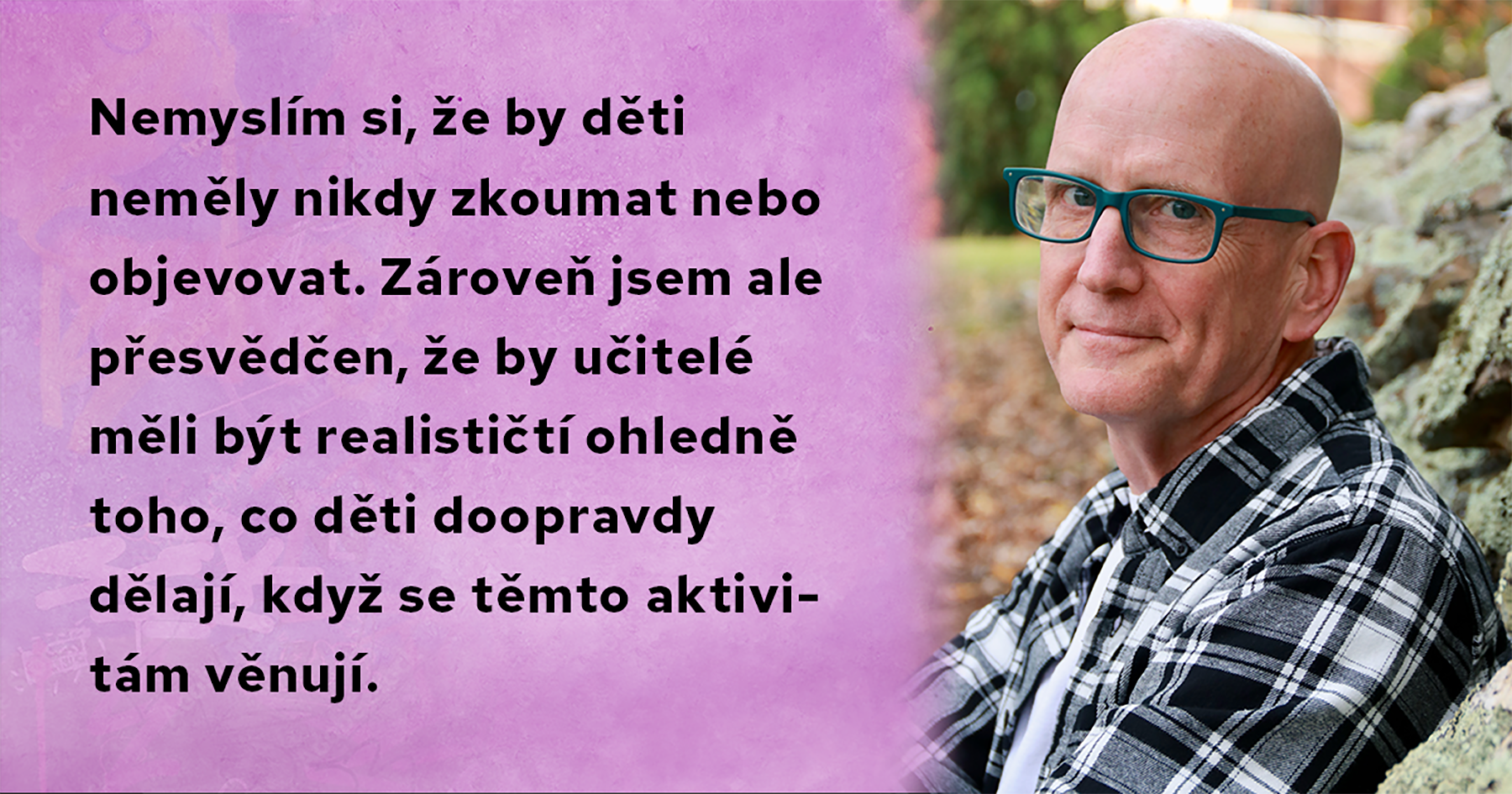
Foto: archiv DTW, grafika: EDU
Proč by se měli učitelé vzdělávat o lidské kognitivní architektuře v době vzestupu umělé inteligence, která představuje myšlení nezatížené limity lidského mozku? Nebude nástup AI do vzdělávání faktorem, který výuku promění natolik, že kognitivní vědy přestanou být relevantní?
Nejsem zrovna futurista. Za tu poměrně krátkou dobu, co se věnuji výzkumu ve vzdělávání — je to asi 20 let — tu bylo hned několik technologií, které měly celý sektor změnit tak, že nezůstane kámen na kameni. Nikdy k tomu nedošlo. Proto mám důvod pochybovat o tvrzení, že tomu tak bude v případě umělé inteligence. Pochopitelně však učitelé musí být kreativní a hledat cesty, jak svým žákům AI zpřístupnit v pozitivním smyslu: aby jejich vzdělání nepoškodila a naopak mu prospěla.
Napsal jste: „Není nikdy chytré říkat dítěti, že je chytré. Věřte, nebo ne, ono kvůli tomu spíš zhloupne. Skutečně.“ Můžete to ještě rozvést? Nemají to dětem nikdy říkat ani rodiče? Jaké poselství vaše kniha přináší jim?
Tomuto tématu věnuji v knize celou kapitolu, takže je nesnadné odpovídat stručně. Jde o odkaz k tématu atribuce (či připisování; attribution), především na práci Carol Dweck. Ta ukazuje nevýhodnost představy — ať už u dětí, nebo dospělých — že úspěch je výsledkem jejich vrozené schopnosti, jejich inteligence. Daleko lepší je, pokud vnímají úspěch jako výsledek vlastní vytrvalosti a dřiny.
Vaše kniha se stala bestsellerem, který čtou učitelé po celém světě. Jaká zpětná vazba vás překvapila — ať už pozitivně, či negativně?
Pochopitelně mám radost z toho, že ji čte tolik lidí. Sem tam se objeví nějaká svérázná kritika, ale daleko častěji mi píší učitelé o tom, jak má kniha změnila jejich praxi k lepšímu.
Máte nějaký vzkaz pro své budoucí české čtenáře?
Doufám, že se váš vztah k mé knize bude podobat vztahu vašich žáků ke škole: užijete si ji, bude pro vás výzvou a alespoň trochu vás změní!
Rozhovor vznikl ve spolupráci s Pavlem Bobkem
Pavel Bobek se stal učitelem v Anglii. V Londýně učil na oceňované veřejné škole v přistěhovalecké čtvrti. Aktuálně působí v Praze na ZŠ Solidarita. Je členem Otevřena a Učitelské platformy. Věnuje se zejména popularizaci výzkumu ve vzdělávání a jeho implikacím pro každodenní učitelskou praxi. V roce 2022 byl jedním z finalistů soutěže Global Teacher Prize Czech Republic. Je autorem připravované knihy Učitelství jako řemeslo.


